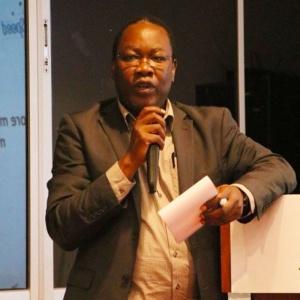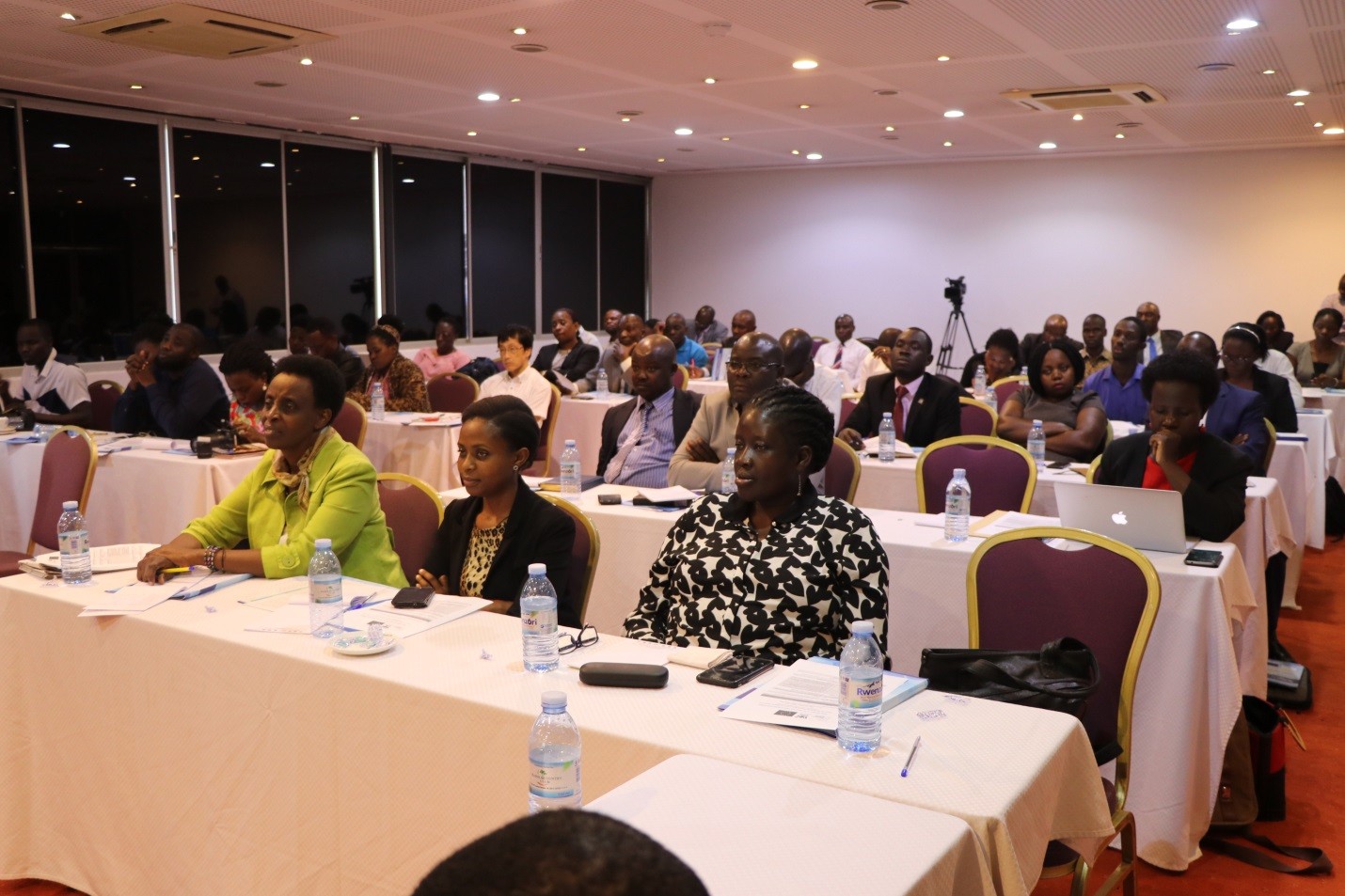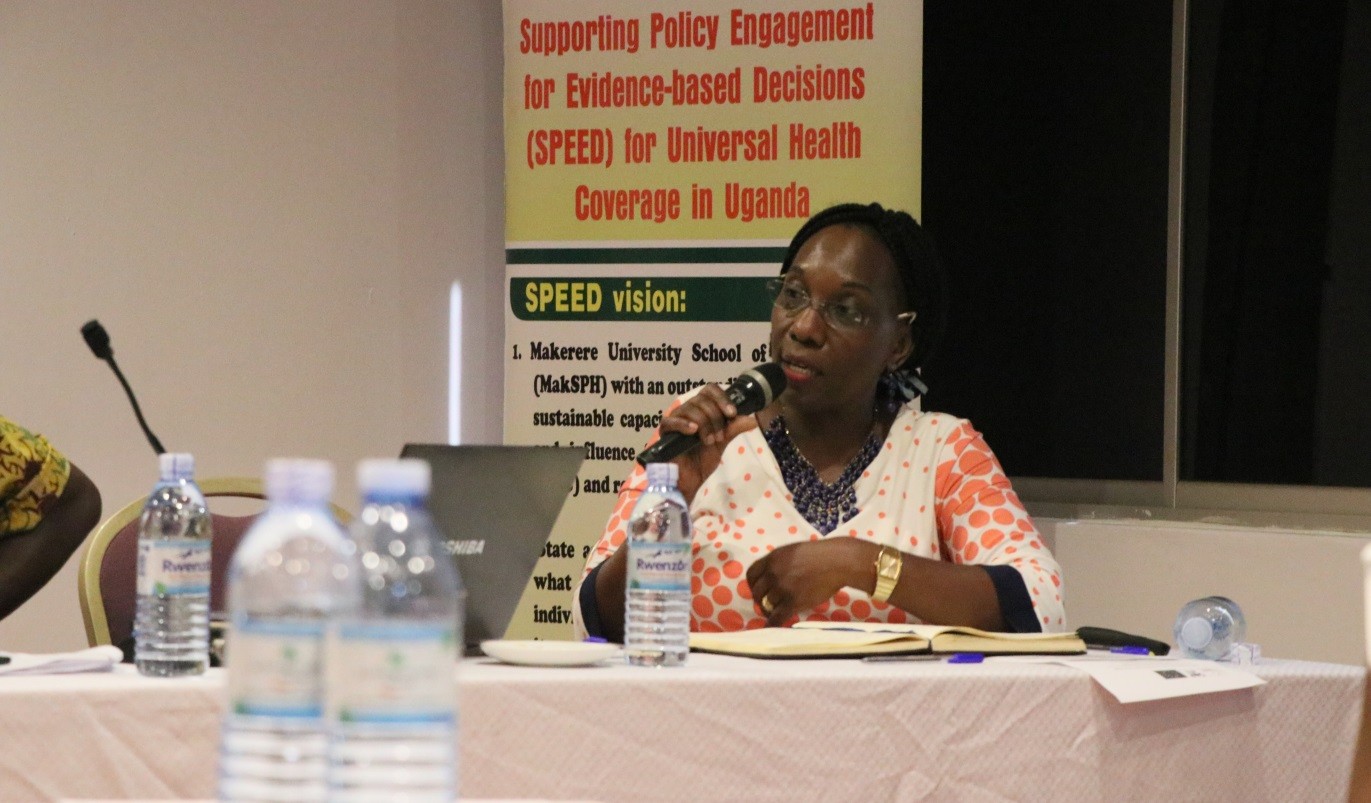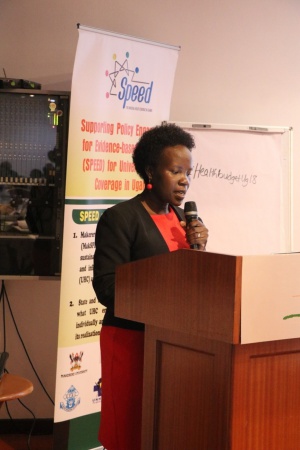A public dialogue on the Health Sector Budget 2018/19 was hosted today afternoon at Kabira Country Club, Kampala, by Makerere School Of Public Health (MakSPH) SPEED (Supporting Policy Engagement for Evidence-based Decisions) project. The dialogue focused on the implications for Universal Health Coverage (UHC) in the Uganda Health Sector Budget for this fiscal year.
In his welcome address, Prof Freddie Ssengooba (pictured above) attributed the necessity of such dialogues to the aim of seeing how actors and key players in the health and other key sectors can be assisted to leverage money within the sector to improve health, especially for the SPEED project.
“These public dialogues can be used to help key actors in the sector partly to hold accountable those resources to improve health where they are allocated, and partly to make it clear to our key players that these resources could be potentially used in a way that improves health benefits”, he stated. He called on the audience to deliberate constructively on how to leverage monies going to other sectors that have implications for health.
In his speech representing the Dean of Makerere School of Public Health, Prof Ssengooba expressed the University’s pride in leading such discussions of policy. He also emphasized the keenness of the university in making sure that society can look to the institution’s participation in identifying solutions to communities’ challenges, because of the amount of knowledge and capacity at the disposal of Makerere University, and the School of Public Health (MakSPH) in particular. In welcoming the audience to the gathering, he urged policymakers as well as academia, to embrace the concept of Universal Health Coverage (UHC), expressing belief in the ability of the panel to generate advice and out – of – the - box solutions for the challenges in the realization of this concept.
Dr Sarah Byakika (pictured below) the Commissioner, Planning in the Ministry of Health (MoH) appreciated the invitation extended to the Ministry of Health as a partner, asserting that such dialogues are developmental to the ministry and country in general. She underlined some key points in the budget which the sector prioritized for the fiscal year 2018/19, expressing gratitude at the increment in budget allocation to the sector from 6.4% of the 2017/18 budget to 7.4% of 2018/19. Also mentioned were the fact that wages take up 26% of the Health Sector Budget, Non – wage expenditures 20% and 8% on infrastructure development; the remaining 46% is covered by donors through projects like GAVI and Global Fund. “As part of priorities along our key sector strategic objectives, we shall continue addressing the key challenges related to human resource (which is critical to the sector) i.e. of attraction, retention, training and development”, she pledged, further revealing that 419 Scholarships would be given out in critical specialties such as in anesthesia, Biomedical engineering, Obstetrics and Gynaecology and general surgery. Dr Sarah acknowledged a World Bank financing receipt of USD 200 million but admitted to having prioritized infrastructure development such as the Special Paediatric hospital in Entebbe, and upgrading of several Health Centres IIs to Health Centre IIIs because they are the principal outlets of primary health care (PHC).
In response to the budget details presented by the commissioner of planning in the ministry of health, Dr Christine Kirunga Tashobya of MakSPH highlighted the unpredictable allocations of the health sector. “As a country, it seems we have moved to look at health as a means of production rather than as a right”, she argued, adding that the government share of expenditure on health per capita is 15% (government contributes 15% to the total expenditure of health for the country, 37% is by the people – out of pocket expenses). She also reasoned that the biggest percentage of the health sector should be wage expenditure because the sector employs a big chunk of professional labour.
In her summary of the dialogue, Dr Elizabeth Ekirapa Kiracho (pictured above) noted that a 1.2% increase in health sector budget had been realized, emphasis on prevention was being done through Q - strategy, attempts were being made to increase functionality of health centres universally so that they could provide the basic package, and the national referral hospital had been refurbished. She reminded participants of the UHC coverage even with national challenges affecting the ability to achieve their objectives, e.g. huge multi-year infrastructure projects, the huge population and the fact that professionals have taken a back bench with regard to advocacy. She reiterated the dialogue’s call for more evidence-based research from academia. She concluded by reminding the participants that everyone has a role to play; more money was needed for health, and more health for the money.
Dr Kenneth Mugambe, the Director Budget, Ministry of Finance Planning and Economic Development, assured the dialogue that the 2019/20 budget would cut back on infrastructure spending and prioritize social development services.
Mr. Julius Mukunda, Executive Director of Civil Society Budget Advocacy Group (CSBAG), Dr Ibrahim Kasirye, the Principal Research Fellow Economic Policy Research Centre (EPRC), and Mr. Tarik Kubach, the Public Finance Management Advisor, European Union delegation to Uganda, graced the function as well as several staff from MakSPH.





